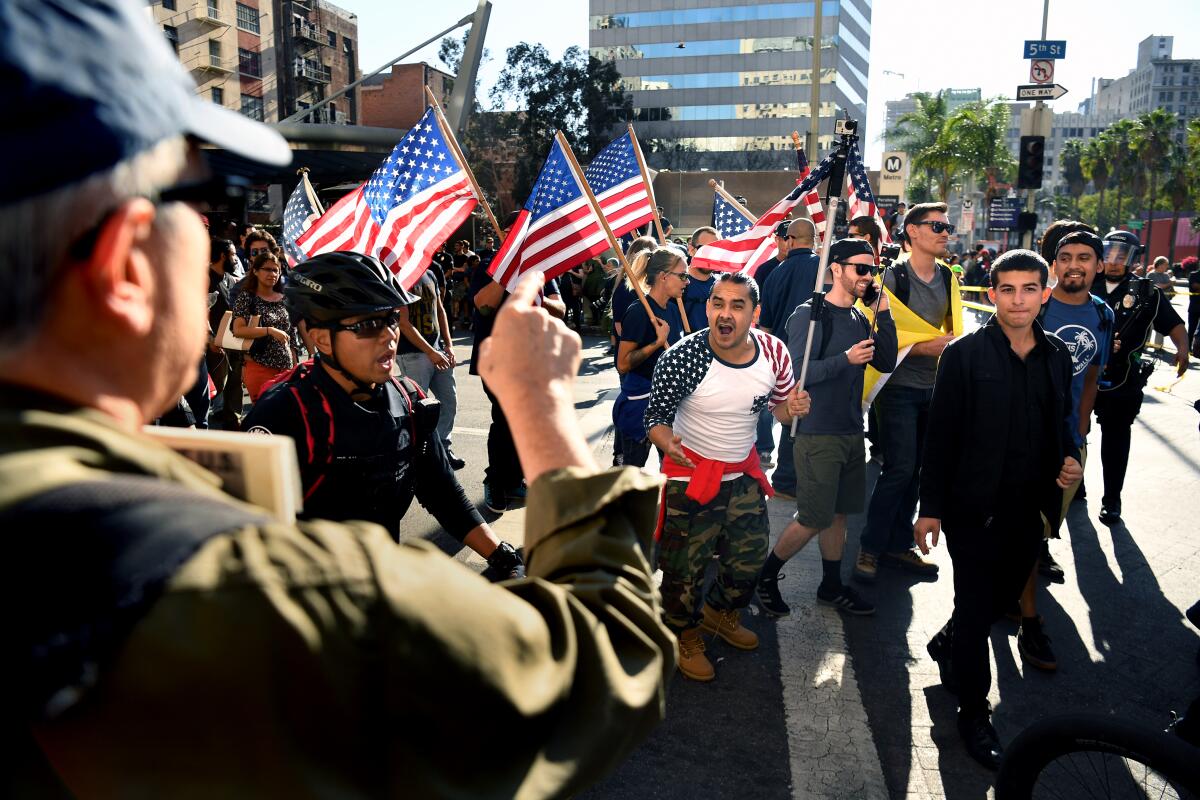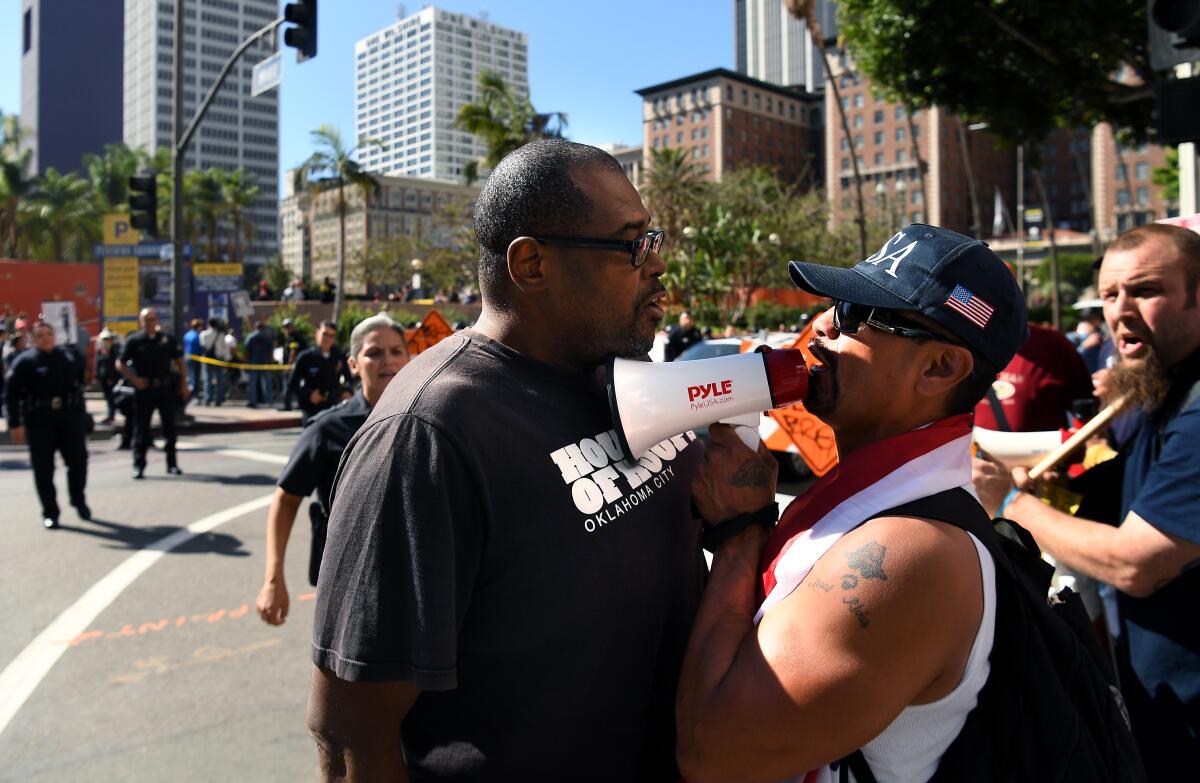LAPD informant infiltrated left-wing activists during Trump protests, records show

- Share via
The Los Angeles Police Department ordered a confidential informant to monitor and record meetings held by a political group that staged protests against President Trump in 2017, a move that has drawn concern and consternation from civil rights advocates.
On four separate occasions in October 2017, the informant entered Echo Park United Methodist Church with a hidden recorder and captured audio of meetings held by the Los Angeles chapter of Refuse Fascism, a group that has organized a number of large-scale demonstrations against the Trump administration in major U.S. cities, according to court records reviewed by The Times.
For the record:
10:42 a.m. July 19, 2019An earlier version of this article misspelled the last name of ACLU attorney Mohammad Tajsar as Tasjar.
The operation was launched by the LAPD’s Major Crimes Division in October 2017, as police across the country were preparing for potential mass demonstrations to mark the first anniversary of Trump’s election, records show.
Police reports and transcripts documenting the informant’s activities became public as part of an ongoing case against several members of Refuse Fascism who were charged with criminal trespassing for blocking a downtown section of the 101 Freeway during two separate anti-Trump demonstrations in September and November of 2017.
On Friday, Chief Michel Moore directed the LAPD’s Office of Constitutional Policing and Policy to investigate the decision to place an informant inside the group. Moore, who also notified the Police Commission and the LAPD inspector general about the issue, said he wanted a “top-to-bottom” review of the facts and circumstances of the case.
An LAPD spokesman declined to make available for an interview anyone involved in the decision to monitor and record the group.

But a law enforcement official with knowledge of the investigation, who spoke to The Times on the condition of anonymity in order to discuss the case candidly, said the decision to embed an informant inside Refuse Fascism was made out of an abundance of caution. Brawls involving anti-fascists and far-right figures in the Bay Area earlier in 2017, and a white supremacist rally in Charlottesville, Va., that left one woman dead and dozens more injured in August of that year, had detectives hoping to prevent similar outcomes in Los Angeles, the official said.
The official also said investigators believed some members of Refuse Fascism had been involved in previous street violence in the Bay Area. The official did not name those members or provide evidence of that claim. Ultimately, the department determined Refuse Fascism did not pose a threat to the public, the official said.
The LAPD did not conduct similar operations involving right-wing groups in the same time frame, according to the official who spoke with The Times, though experts have said there is little organized far-right activity within the department’s jurisdiction.
Ultimately, the anti-Trump protest that the group organized passed with little incident. Roughly 400 demonstrators marched through downtown, resulting in just two arrests and no injuries. While a small contingent of the president’s supporters showed up to hold a counterprotest, LAPD officers kept both sides apart without any clashes.
The documents do not offer a reason for the decision to monitor the group. But in a recent court filing, a deputy city attorney said the informant was deployed after “the September freeway blockage.”
At a time when political activism has become increasingly common in the face of widespread opposition to the Trump administration’s policies, civil rights advocates called the LAPD’s tactics “deeply troubling.”
“When you know that your investigation is going to infringe on core political rights that communities have, you have to be damn near certain that there is some criminal activity afoot,” said Mohammad Tajsar, a staff attorney with the American Civil Liberties Union in Southern California who specializes in surveillance matters. “It cannot be that you’re relying on speculation, hunches, innuendos or your gut feeling.”
‘There’s no reason that these people have to be sent in to spy on peaceful protesters who are speaking out about crimes against humanity…. It’s outrageous.’
— Yesenia Cruz, member of Refuse Fascism L.A.
Tajsar said that by engaging in these tactics, the LAPD has probably damaged its ability to work cooperatively with demonstrators in the future, something that could prove increasingly problematic with the contentious 2020 presidential election looming.
Brian Levin, a former police officer who now serves as director of the Center for the Study of Hate and Extremism at Cal State San Bernardino, said law enforcement agencies often struggle to balance civil liberties against public safety needs when trying to assess potential dangers associated with political protest. But Levin, who routinely monitors street rallies, said Refuse Fascism rarely engages in violence and expressed concern about the decision to infiltrate the group.
“I think the LAPD may have been scrambling during a very difficult, violent, political season in California, where people were traveling to different cities and there were folks trying to infiltrate mainstream groups to a certain degree,” he said. “That being said, this ham-fisted execution, against arguably one of the least likely groups to engage in violence, is going to create a set of questions going forward.”
Yesenia Cruz, a 27-year-old member of Refuse Fascism in Los Angeles who was among those charged in the freeway protests, said the LAPD’s decision to infiltrate her group was an intimidation tactic meant to dissuade others from joining their cause.
“There’s no reason that these people have to be sent in to spy on peaceful protesters who are speaking out about crimes against humanity…. It’s outrageous,” she said.
In the weeks leading up to the first anniversary of Trump’s election, Refuse Fascism had popularized the slogan “Nov. 4th, It Begins,” hoping to attract eyes to its planned protests. The message was incorrectly interpreted as a threat of violence by many conservative commentators at the time.
But according to the LAPD informant’s reports from the Refuse Fascism meetings, the group’s discussions largely centered on the idea of stirring average Angelenos to action by disrupting their commutes or routines.
According to the court records, the informant’s reports noted only vague references or jokes about violence, never any legitimate plans or threats.
During an Oct. 18, 2017, meeting, the informant contacted an LAPD detective to warn that one member of the group seemed “aggressive” but did not elaborate. In other instances, the informant overheard members of the group discussing plans to burn a “Make America Great Again” hat on the UCLA campus in the future, and one Refuse Fascism member made a joke about scalding the president with hot coffee.
Frank Wulf, the pastor of Echo Park United Methodist Church, said he was also bothered by the LAPD’s decision to place an informant inside a religious institution. Describing the police tactics as an “overreach,” Wulf said he wrote a letter to Los Angeles City Atty. Mike Feuer this year asking him to drop all charges against the nonviolent protesters.
“I certainly have concerns about it,” he said of the LAPD’s decision to conduct an operation at the church. “I can’t speak for the church body, but it does seem that it is an interference in our right to use our church building in a way we see fit…. It does have a chilling effect on people who, according to the Constitution, have a right to protest.”
The Los Angeles Police Commission requires the department’s anti-terrorism intelligence section to seek the approval of the commission’s president or a member of the board’s Undercover Investigation Committee before it deploys an informant.
Richard Tefank, executive director of the Police Commission, said in an email that he had “no information” that the investigation into Refuse Fascism met the standards for requiring the commission’s approval. A department spokesman said the informant was deployed as part of a criminal investigation, not an anti-terror probe.
But several members of Refuse Fascism and a defense attorney involved in the ongoing criminal proceedings have claimed the case was launched by the anti-terror section. Court records indicate only that the investigation was launched by the Major Crimes Division. The anti-terror section falls under the authority of Major Crimes.
The LAPD’s use of an informant has proved problematic for city prosecutors seeking convictions of the Refuse Fascism members who blocked the 101 Freeway twice in late 2017.
Cruz, who did not attend either protest but was charged with two counts of conspiracy for organizing the freeway blockages, said the case against her was dropped after a judge granted a defense motion that the informant’s identity would have to be revealed during her trial. Deputy City Atty. Andrew Solomon repeatedly objected to any mention of the informant’s role in the case during hearings last week in the trial of two other Refuse Fascism members charged in the freeway blockage.
With dozens of members of Refuse Fascism lining the gallery and fliers decrying the LAPD’s use of an informant hung up on lampposts on several street corners near the Metropolitan Courthouse, the topic was unavoidable.
At one point, Solomon asked defendant Miguel Antonio whether he thought he had committed a crime by blocking the freeway.
“I think what’s criminal is that the LAPD sent a spy into our meetings,” Antonio replied.
A jury deadlocked on charges against Antonio and another Refuse Fascism member, Chantelle Hershberger, in late June. A retrial is scheduled to begin next week, said Rob Wilcox, a spokesman for the city attorney’s office.
Of the nine people arrested in connection with the freeway protests, three reached plea deals that will allow them to enter a diversionary program and have their records cleared if they adhere to the terms of the agreements, Wilcox said. Three more are awaiting trial.
Wilcox also disputed Cruz’s assertion that her case was dropped due to a court ruling that would have exposed the informant’s identity at trial. That decision “was based, in part, on new information discovered after the case was filed,” he said.
More to Read
Sign up for Essential California
The most important California stories and recommendations in your inbox every morning.
You may occasionally receive promotional content from the Los Angeles Times.










